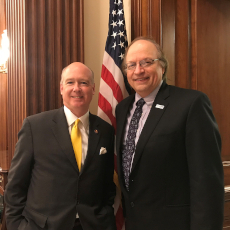
Last week, the College was part of the Allergy and Asthma Network’s (AAN) Virtual Advocacy Day as part of National Asthma and Allergy Awareness Month. College President J. Allen Meadows’ virtual presentation focused on the state of allergy and asthma in the U.S. and how advocacy continues even in our current situation. The College enjoys our partnership with AAN, as we have common goals in advocating for care for allergy and asthma patients.
While the Advocacy Council postponed our Strike Force meetings in Washington D.C. earlier this month due to the pandemic, our advocacy efforts have not diminished. In March, the Advocacy Council and College sent a letter to The Honorable Alex Azar, Secretary of the Department of Health and Human Services (HHS), requesting payment for services you provide via telephone during the COVID-19 Pandemic. We sent this letter before any other medical specialty called for these payments. As a result of efforts from many medical specialties, telephone services are now covered.
Also in March, the Advocacy Council worked with Majority Leader Steny Hoyer (D-MD-05) and Rep. Phil Roe (R-TN-01), sponsors of H.R. 2468, the School-Based Allergies and Asthma Management Program Act, to add language to the bill that requires schools to coordinate with a student’s asthma or allergy care provider when developing a student’s asthma management plan.
We enjoy professional relationships with congressional health policy makers as well as with our own state Senators and Representatives. Past meetings have included staff from the Senate Finance Committee; Senate Health, Education, Labor and Pensions Committee; House Ways and Means Health Subcommittee; and House Energy and Commerce Health Subcommittee.
Our relationships with members of Congress, including Representative Morgan Griffith (R-VA) and Robert Aderholt (R-AL), were critical in preserving our right to mix allergy extracts in our offices. In addition, our connection with Rohit Khanna (D-CA) has been instrumental in his leadership role seeking increased funding for food allergy research.
Despite the pandemic, we are in regular contact with people we know on Capitol Hill to have an impact on legislation to benefit our patients. Advocacy is a vital component of the College, and we will continue our efforts in areas such as network adequacy, surprise billing and physician-focused payment.


